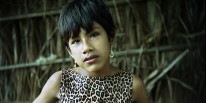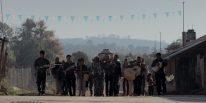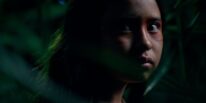Biabu Chupea: Breaking the Silence
(Biabu Chupea: Un grito en el silencio)
Priscila Padilla / Colombia / 2022 / 82 min





Hot Docs Canadian International Documentary Festival
Cinélatino Rencontres de Toulouse
Monterrey International Film Festival
Jury AwardMálaga Film Festival
Audience AwardGimli Film Festival
LA Femme Film Festival
Bolivia Human Rights Film Festival
Pukañawi Award
Pricing
Related Films
 Atempa, Dreams by the River(Atempa, Sueños a la Orilla del Rio)Edson J. Caballero TrujilloTino dreams of becoming a “Muxe Queen”. Though born into a male body, as Tino enters adolescence, she begins to dress as a woman and embrace her ...
Atempa, Dreams by the River(Atempa, Sueños a la Orilla del Rio)Edson J. Caballero TrujilloTino dreams of becoming a “Muxe Queen”. Though born into a male body, as Tino enters adolescence, she begins to dress as a woman and embrace her ... Nudo Mixteco(Nudo Mixteco)Ángeles CruzTaking place in a rural Mixtec village in Oaxaca, southern Mexico, Nudo Mixteco follows the return of María, Esteban, and Toña, each from a ...
Nudo Mixteco(Nudo Mixteco)Ángeles CruzTaking place in a rural Mixtec village in Oaxaca, southern Mexico, Nudo Mixteco follows the return of María, Esteban, and Toña, each from a ... Valentina or the Serenity(Valentina o la serenidad)Ángeles CruzMexican filmmaker Ángeles Cruz returns to her Indigenous community of Villa Guadalupe for her second feature film, a tenderly poignant tale of loss ...
Valentina or the Serenity(Valentina o la serenidad)Ángeles CruzMexican filmmaker Ángeles Cruz returns to her Indigenous community of Villa Guadalupe for her second feature film, a tenderly poignant tale of loss ... The Eternal Night of the Twelve Moons(La eterna noche de las doce lunas)Priscila PadillaOn the Guajira peninsula in northern Colombia, the customs of the indigenous Wayuu still prevail. In Priscila Padilla‘s documentary The Eternal ...
The Eternal Night of the Twelve Moons(La eterna noche de las doce lunas)Priscila PadillaOn the Guajira peninsula in northern Colombia, the customs of the indigenous Wayuu still prevail. In Priscila Padilla‘s documentary The Eternal ... The Wind Blows the BorderLaura Faerman, Marina WeisOn the violent border between Brazil and Paraguay, a battle between agribusiness and indigenous sovereignty wages. Filmmakers Laura Faerman and Marina ...
The Wind Blows the BorderLaura Faerman, Marina WeisOn the violent border between Brazil and Paraguay, a battle between agribusiness and indigenous sovereignty wages. Filmmakers Laura Faerman and Marina ...Synopsis
Embera Chami with English subtitles
Biabu Chupea offers a poignant look at a woman’s struggle for bodily autonomy within the Embera Chamí Indigenous community in Colombia. The film follows Luz, who left her homeland after learning she had suffered genital mutilation as a child. Living in exile, Luz remains cut off from her roots, yet she strives to preserve the cultural memory that still links her to her origins.
Luz’s only connection to her community is Claudia, another Embera woman, and her close friend. Recognizing Luz’s pain, Claudia decides to return to the territory. She initiates heartfelt conversations with Embera Chamí women about the enduring practice of ablation and the deep, generational wounds it has produced. The documentary uses weaving, song, and stories to create a space for healing, resistance, and collective insight.
With both ethnographic depth and poetic nuance, Biabu Chupea shows how Indigenous women must navigate between tradition and the rights they deserve. Director Priscila Padilla prompts viewers to ask a difficult question: Are women truly free to choose their own paths?
Related Subjects
About the Director
Priscila Padilla is a screenwriter, director, and producer for film and television. She has 30 years of experience in research, scriptwriting, development, management of audiovisual projects, and consulting on documentary scripts. Her extensive academic background has led her to approach her documentary projects with a personal aesthetic and narrative style, in which the conflicts between women and society are a central narrative theme.
She graduated in Film Directing from the Conservatoire Libre du Cinéma Français in Paris, France, and has also pursued studies in Cinematic Aesthetics, Art History, Music Appreciation, Film and Television Production, Television Screenwriting, Acting Direction, Documentary Aesthetics, Film Editing, and Life Stories.
Among her most notable works is a cinematic triptych that explores the female body in different contexts. The Eternal Night of the Twelve Moons tells the story of women’s bodies in the Wayuu culture. Biabu Chupea: Breaking the Silence presents female genital mutilation within the Embera Chamí culture. And in Un nuevo amanecer, she addresses the female body in contexts of war and peace.
Press
“Despite the darkness of the subject, color, song, and notes of hope make this documentary a success and an essential testimony to a practice which, although dating back to colonization, still weighs as much as a curse on Emberá culture and on women in particular.” – Cinespaña
“Biabu Chupea subtly exposes the path they follow to reinforce their spirituality and explore their own beliefs about pleasure.” – Autour du 1er Mai
“A film that asks whether women have the right to decide about their bodies.” – Semana
Notes on the Film
“Biabu Chupea is an audiovisual story told from the perspective of several Embera Chamí Indigenous women. One of them is ‘Luz’, who discovers she doesn’t have a clitoris when she is 17 years old. Luz is not her real name—she could be called María, Eva, or Dolores. We, the women involved in the making of this documentary, decided to call her Luz. The meaning of this vital element—light (Luz)—is a symbol that discriminates against no one. Light was shed on the life stories of many women centuries ago, to enlighten them so that they would decide to speak about their daily lives after a long period of absolute silence.
That same light continues to reveal this story through weaving and singing. The Embera Chamí women speak openly and honestly about how they live inside their bodies, while Claudia has an accurate and irreversible revelation: all women are born with a clitoris. A biological fact that may seem obvious to others, but which becomes her starting point in reappreciating her body as a woman.
Making this film was an adventure of mutual self-discovery that Priscila and her team shared with the Embera Chamí women in their territory: lots of weaving, singing, swimming in the river, and sowing the land, in the wonderful and enigmatic landscape between Risaralda and Chocó—the ancestral home of the Embera Chamí community. Ablation is no longer practiced in the community of Bajo San Juan, part of the unified Indigenous reservation of the Embera Chamí in Pueblo Rico (Risaralda).
The gray and somber Bogotá is the other setting of the documentary. A place where this Indigenous culture arrives—forced by Colombia’s armed conflict—to survive on the cold city sidewalks, trying to sell their unique weavings, bargaining their art in a language they barely speak, holding on to the fragile thread that keeps their culture alive. The documentary Biabu Chupea invites us, women from all cultures, to reflect on whether we are truly free to decide the destiny of our own bodies.”
– Priscila Padilla, Director